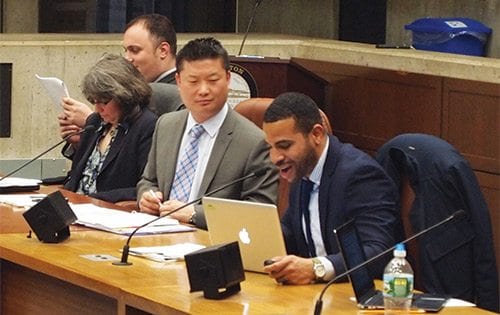
Secondgrader Quinn Bowles made the case for maintaining funding for history instruction in the Boston Public Schools.
“We need to know what happened in the past so we don’t make the same mistakes again,” he said, testifying during a hearing in the City Council’s Ianella Chamber.
Budgetary constraints and the pressure schools face to raise students’ scores on math and English language arts MCAS tests have whittled down history and social studies instruction at Boston middle and high schools. Students and teachers testified on the importance of history during the hearing.
“We frequently talk about the achievement gap between students of color and their white peers, or between students in urban and suburban schools, as a matter of ELA and math scores,” said Neema Avashia, a John W. McCormack Middle School civics teacher. “But what we leave out of the conversation are the gaps in social and cultural capital that occur for our students because their education has been narrowed down to the tested subjects, leaving no room for the kind of capital that comes from learning art, history, civics and music.”
Donnie Tran, assistant superintendent of professional learning, stressed that there will not be cuts among the three staff members who support history and social studies in the district’s central office. Jackson said the staff’s $90,000 budget was small, given their mission of developing curricula for history and social studies.
“I’m taken aback by how small it is,” he said. “A budget is a values statement, and there’s not a lot there.”
Few are certified
Tran told the councilors that 60 percent of the instructors teaching history and social studies are not certified to teach in those subject areas. Jackson said he is concerned about the lack of certification.
Many teachers who testified said history and social studies positions have been cut over the years as their schools’ budgets face more and more strain. While in past years the school department expanded social studies and added civics courses, those gains have been reversed in recent years.
“In a majority people-of-color city, it’s a travesty that we have only one teacher of African American history,” said Jessica Tang, a former teacher and current Boston Teachers Union organizer.
Lena Papagiannis, a history teacher at the John D. O’Bryant school, said the prospect of cuts to history may be dissuading teachers from obtaining certification.
“Why would teachers invest in training and professional development if they think their position will be cut next year?” she said.
The budget hearing, the first of several scheduled by the council’s Education Committee, gave the teachers and students a chance to make the case for preserving history and social studies classes.
City councilors Tito Jackson, Sal LaMattina, Anissa Essaibi George, Andrea Campbell and Ayanna Pressley questioned them about the department’s commitment to the disciplines and expressed their support.
“It’s because of history and social studies — because of what I learned — that I’m here today,” LaMattina said.
While it’s unclear what may be cut this year, many teachers said they feared a long-term trend of cuts could eliminate history and social studies altogether.
“If we don’t take action, there is going to be a generation of young people who lack the historical understandings and critical thinking skills that underpin effective advocacy, and serve as the foundation for continued progress towards a more just and equitable society,” Avashia said.


![Banner [Virtual] Art Gallery](https://baystatebanner.com/wp-content/uploads/2024/04/Cagen-Luse_Men-at-store-e1713991226112-150x150.jpg)



